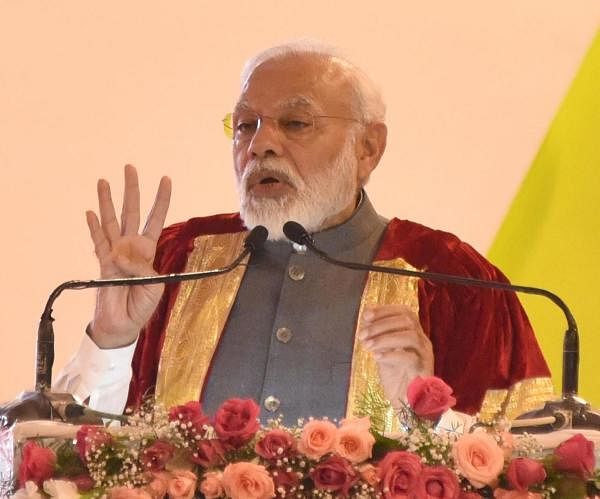
Prime Minister Narendra Modi on Friday asked the scientific community to contribute to make India a five-trillion-dollar economy besides helping the masses with innovative solutions to their daily challenges.
“Innovate, patent, produce and prosper should be motto of young scientists. Innovation has to be for the people and by the people. This would lead to faster (national) development,” Modi said inaugurating the 107th session of the Indian Science Congress at the University of Agriculture Sciences here.
“Technology and logical temperament are what the new India needed so that we can give a new direction to our social and economic sector,” he said.
Modi, however, didn’t elaborate on what he meant by India’s need of “logical temperament” for a new direction in social and economic sector. But his comments come at a time when scientists and researchers also joined the protests on the controversial Citizenship (Amendment) Act.
On the technology front, the pime minister said it was the bridge between the government and the common man, who could feel now that he was not separated from the government and his/her voice too would be heard. “The growth story of India depends on its achievements in science and technology,” Modi said at the mega event attended by nearly 15,000 delegates.
“Bengaluru traditionally was the city of gardens but it has now been converted into a wonderful field of startups because of the wonderful ecosystem of science and innovation,” he said.
The prime minister asked scientists not only to contribute for economic development but also to extend a helping hand in solving societal issues. He listed issues ranging from water woes to elimination of single use plastics that scientists must take up as challenge.
“Cheap and long lasting solutions to single use plastics that can be manufactured by rural artisans, and small and medium scale industries must come from your laboratories,” he said.
“Similarly metals should be eliminated from electronic waste and technologies needed to reuse such waste.”
The prime minister also listed out some of the government’s big scientific future plans ranging from a deep ocean mission being formulated by the Union Ministry of Earth Sciences to eradication of tuberculosis by 2025 and turning India into a $100-million hub for the production of biomaterials like vaccines through “right policy, research and human resources.”
Union Science Minister Harsh Vardhan, Karnataka Chief Minister B S Yediyurappa and Indian Science Congress general president K S Rangappa, former vice chancellor of Mysore University, were present on the dais. Two Nobel laureates –Stefan Hell and Ada E Yonath – were in attendance.
Incidentally, the inauguration was abruptly ended after the prime minister’s speech without the customary vote of thanks
